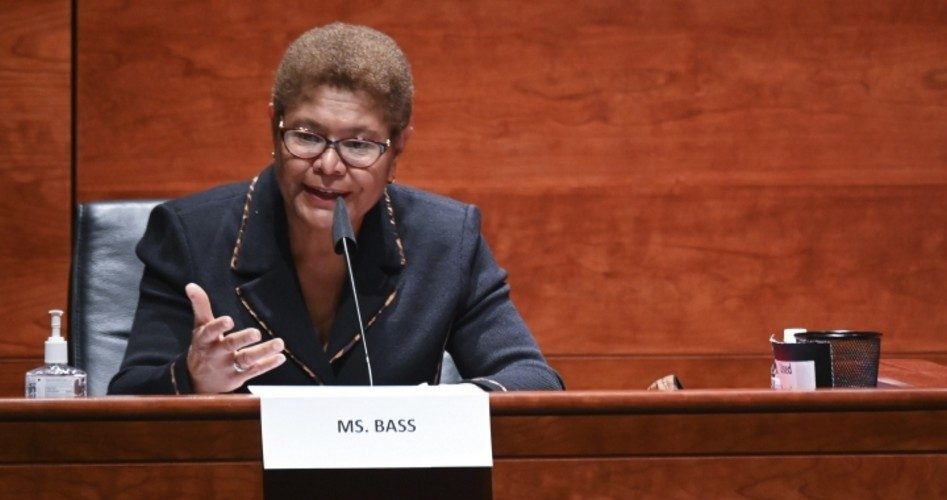
The tragic death of George Floyd at the hands of a Minneapolis police officer has become the pretext for the Marxist and Leninist Left in America to tear down statues of American history, push for the renaming of military bases named after Civil War generals, pressure the Hollywood “cancel culture” to axe popular television shows such as Cops, and call to defund police departments in favor of funding “community organizations” agitating for even more radical leftist demands. Sadly, the halls of Congress are not immune from this insidious anti-police push.
Currently before Congress are three bills threatening the autonomy of your local police and other law-enforcement agencies: H.R. 7120, S. 3912, and S. 3985.
Better known as the “Justice in Policing Act of 2020,” H.R. 7120 was introduced on June 8, 2020, with Representative Karen Bass (D-Calif.) as the lead sponsor of the bill. This bill seeks to prohibit local law enforcement from practicing what it describes as “racial, religious and discriminatory profiling” and would mandate all local police officers to be indoctrinated in sensitivity training about the adverse effects of such profiling. The bill also bars police officers from performing certain restraining tactics, such as chokeholds.
The bill would achieve these and other reforms by knocking down the barriers of federalism as established by the Constitution. According to a fact sheet about the bill put together by the Congressional Black Caucus and the House Judiciary Committee, the “Justice in Policing Act” would:
1. Establish a national standard for the operation of police departments;
2. Mandate data collection on police encounters;
3. Reprogram existing funds to invest in transformative community-based policing programs; and
4. Streamline federal law to prosecute excessive force and establish independent prosecutors for police investigations.
In other words, the bill aims to defund police departments and allocate those funds to leftist “community organizations,” further perpetuating the Left’s war on police. The bill would lower the standards required to prosecute police officers, to include not only instances in which any misconduct was intentional, but also cases in which misconduct was unintentional. Establishing independent prosecutors in the Justice Department to investigate local police officers would further expand the federal government’s control over local and state law-enforcement agencies. Such “independent” investigations are akin to the so-called civilian police review boards promoted by communists during the 1960s. Furthermore, establishing a “national standard” to govern how local police departments operate is a significant step toward nationalizing police.
The bill has already garnered 230 Democrat cosponsors — more than enough to easily guarantee its passage in the House of Representatives. As for the bill’s sponsor, Congresswoman Karen Bass (shown) is no stranger to the communist Left. In a 2008 interview with the authors of the book Black Los Angeles: American Dreams and Racial Realities, Bass boasted how from an early age she was surrounded and influenced by members of the Communist Party USA. She recalled,
It [the white Left] played a huge role for me. In Hamilton [High School] for instance, lots of the Jewish parents were activists. Some of them were in the Communist Party. So I grew up with a lot of red diaper babies. And there were some African American parents who were in the Communist Party. There were teachers who were in the Communist Party. So white radicals were very influential. And at the same time you have the Panthers and the whole Black movement.
Bass has remained in communist and socialist circles all her life. She was a member of both the Black Panther Party and the Venceremos Brigade and has worked closely with the Democratic Socialists of America. Since its founding in 1969, the Venceremos Brigade served as a front organization for Communist Cuba’s intelligence agency, the DGI, to recruit Americans. On April 17, 1993, Bass was one of several speakers invited to the West Coast Socialist Scholars Conference 1993, held at the University of California, Los Angeles.
Bass was also a protégé of the late Oneil Cannon, a leading member of the Communist Party USA’s National Central Committee. On January 30, 2017, on the floor of the House of Representatives, Representative Bass honored Cannon as her “friend and mentor.” In the 1940s, Cannon was a member of the pro-Soviet and Marxist-leaning Independent Progressive Party before joining the Communist Party in the 1950s, at the height of the Cold War. At the time, the CPUSA was under the direct control of the Soviet Union through its intelligence arm the MVD/ KGB. Cannon rose to serve on the CPUSA’s Southern California Committee before being elevated to membership in the National Central Committee — the ruling body of the CPUSA.
Bass holds a dismal score of 25 percent on The New American magazine’s “Freedom Index,” which rates members of Congress on their fidelity to the Constitution. Nevertheless, she is considered a rising star in the Democratic Party and one of the most influential members in the House of Representatives. In 2018, she was elected chair of the Congressional Black Caucus. Representative Bass also serves as chair of both the House Subcommittee on Africa, Global Health, Global Human Rights and International Organizations and the Subcommittee on Crime, Terrorism and Homeland Security. Her “Justice in Policing Act” is the most far-reaching and radical bill of its kind to go after law enforcement. Should it pass and be enacted into law, Bass’ bill would virtually handcuff local police from effectively serving and protecting their communities.
On the Senate side, former 2020 Democrat presidential candidate Senator Cory Booker (D-N.J.), who boasts an even lower “Freedom Index” score of 18 percent, has introduced a similar bill, S. 3912. The formal or long name for Senator Booker’s bill is “A bill to hold law enforcement accountable for misconduct in court, improve transparency through data collection, and reform police training and policies.” And as of June 20, this bill has 36 cosponsors in the Senate.
Meanwhile, Senate Republicans are already buckling at the knees, eager with their own compromise police-reform bill known as the “Just and Unifying Solutions To Invigorate Communities Everywhere Act of 2020” or the “JUSTICE Act” (S. 3985), introduced by Senator Tim Scott (R-S.C.). Like both the Bass and Booker bills, Senator Scott’s bill would also reform policing practices and hold officers more accountable. According to Senate Republican Conference Chairman John Barrasso (R-Wyo.), the JUSTICE Act “eliminates chokeholds, it brings in a duty to intervene if there’s excessive force and it certainly provides more cameras for police officers.”
However, as is often the case, the problem with such compromises in Congress is that the compromise always moves to the left — never does it move to the right. During her remarks on floor of the House on June 17, Representative Bass even commended the Republican Senate bill for including many proposals from her bill, albeit not as strongly worded. “I am hopeful [about] my colleagues on the other side of the isle when I hear that many of our proposals have been incorporated in what I hear is coming out of the Senate, in a different way — not as strong, not as powerful — but it makes me feel like there is a pathway for us to do this,” Bass remarked.
Even if the Republican bill isn’t as far-reaching as those of the Democrats, it would still serve as an incremental victory for the communist Left in their war against police, as it would also increase the present scope and reach of the federal government’s control over local and state police departments. Should it pass and be enacted, it would likely serve as a precedent for even further congressional overreach. As of June 20, Senator Scott’s “JUSTICE Act” has 46 cosponsors in the Senate.
Local police officers will not be able to effectively serve and protect their communities if they are burdened with the unconstitutional overreaches of the federal government from any of these three bills. The 10th Amendment of the U.S. Constitutions plainly states, “The powers not delegated to the United States by the Constitution, nor prohibited by it to the States, are reserved to the States respectively, or to the people.”
Jurisdiction over local police departments, sheriff’s offices, state police/troopers/highway patrol, and other local law-enforcement agencies is not one of the powers delegated to the federal government by the Constitution. Therefore, any and all “police reforms” fall under the purview of local and state governments. It is both inappropriate and unconstitutional to enact such measures at the federal level, assuming powers delegated to neither Congress nor the Executive Branch.
Local police departments and sheriff’s offices serve the people in their local municipalities or counties; they are not officers of the federal government. All three bills — H.R. 7120, S. 3912, and S. 3985 — are unconstitutional and should be stopped in Congress or vetoed by the president, should the Congress fail to uphold the Constitution by passing any one or all three of these bills.
Since 1963, The John Birch Society has run and maintained its “Support Your Local Police and Keep Them Independent” action project, partly in response a plot against police as uncovered by the U.S. Senate Subcommittee on Internal Security in 1961. As part of this project, The John Birch Society encourages its members to form ad-hoc SYLP committees to pull both members and non-members alike to protect local police departments or sheriff’s offices and the communities that they serve. The John Birch Society has also created a federal legislative alert, entitled “Support Your Local Police: Stop ‘Police Reform’ Bills,” for anyone who is interested in protecting the autonomy of their local police. The alert allows a person to send a prewritten, editable e-mail, phone, tweet, and/or video message his or her U.S. representative, senators, and President Trump in order to urge them to stop and oppose all three “police reform” bills: H.R. 7120, S. 3912, and S. 3985. The legislative alert can also be found here.
It is imperative that the American people support their local police and keep them independent from the federal government. Historically, national police are the hallmark of dictatorships and oppression around the world. The autonomy of our local police is paramount to the survival of our Republic.
Photo: AP Images





